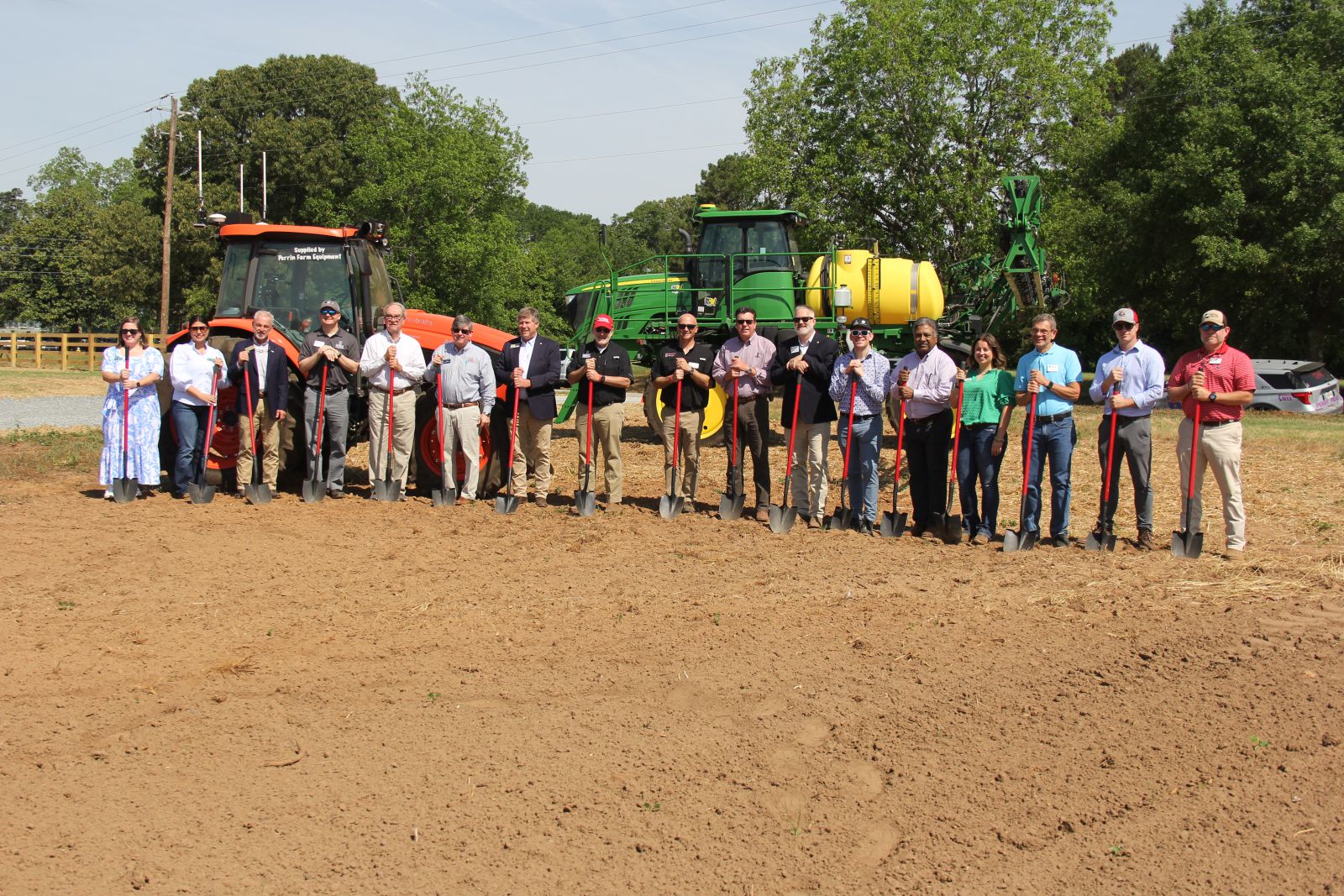GFB News Magazine
UGA Grand Farm will be precision ag research hub
by Jennifer Whittaker
Editor
Posted on August 30, 2025 2:45 PM
Precision ag equipment expected to shape the future of farming is being researched at the University of Georgia (UGA) Grand Farm in Perry. The 250-acre farm, located east of the Georgia National Fairgrounds & Agricenter on Elko Road, is owned and managed by the UGA College of Agricultural & Environmental Sciences (CAES).
CAES is working with Grand Farm in North Dakota to arrange partnerships with companies and inventors developing new equipment and software designed to address labor issues and grow crops more efficiently.
During a groundbreaking ceremony May 2, more than 200 attendees heard from UGA President Jere Morehead, Georgia Agriculture Commissioner Tyler Harper, Georgia Sen. Larry Walker, UGA CAES Dean & Director Nick Place, and Grand Farm Ecosystems Director Andrew Jason from North Dakota.
“The UGA Grand Farm serves as a wonderful opportunity to build on what we’ve already been doing in precision agriculture at UGA in recent years,” Morehead said. “The UGA Grand Farm will serve as the hub for precision agriculture. It will host research aimed at decreasing inputs for farmers and getting young people excited about careers in precision agriculture.”
UGA CAES officials say the Grand Farm will be a hub for research, education and sustainable agriculture practices, harnessing the power of robotics and data analytics to increase farm productivity, conserve resources and ensure food security for future generations.
Precision ag technology being tested at the UGA Grand Farm includes: forefront, the Aigen – a solar-powered robotic weeder; middle right, the Solinftec Solix – a solar-powered robot that spot-applies herbicides & scouts fields to collect crop data. Irrigation pivot in the background uses iCrop precision irrigation & data analytics technology. / Photo by Jennifer Whittaker
Robotic technology hits the field
The UGA Grand Farm will develop and demonstrate new ag technology and automation focused on Georgia’s specialty crops and Southeast agriculture.
“We’re taking a bold step to ensure that Georgia agriculture continues to remain the No. 1 industry in our state,” Place said. “We intend for this farm to be where research meets real world applications.”
Drones, self-driving tractors, solar-powered robotic weeders and advanced field sprayers are some of the equipment researchers will be testing in crops at the farm.
Dr. Luan Oliveria, a UGA CAES assistant professor and precision ag specialist, is studying the Solinftec Solix – a fully autonomous robot that uses artificial intelligence models to instruct the 20-30 nozzle sprayer system to spot-apply herbicides where needed.
The robot’s six, 3-D cameras can also scout fields and collect real-time data on plant health, height and stand counts. The robot is solar powered by day and runs on a battery at night. The Solinftec Solix runs on four wheels and can cover about 4.5 acres per hour.
“This robotic sprayer could be used to spray pre-emergent herbicides to kill weeds in winter and spot spray post-emergent herbicides. All types of chemicals can be applied through the sprayer,” Oliveria said. “This year we’re training the robot on a bell pepper crop to recognize what bell peppers are and the stages of the crop.”
Oliveria said UGA Extension researcher Wesley Porter is using the robot to study its potential for applying cotton growth regulator that keeps cotton plants a uniform height.
UGA doctoral student Regimar Dos Santos is researching the Ecorobotix ARA Field Sprayer. This sprayer is designed for ultra-targeted application of crop chemicals and fertilizers. It has six cameras programmed to identify weeds and 156 nozzles. Dos Santos said the sprayer can be programmed to only open nozzles right over weeds.
The Ecorobotix ARA Field Sprayer can cover about 8 acres an hour, Dos Santos said. Its cameras can operate during the day or at night. Farmers will operate the system via their mobile phones or a tablet.
Kenny Lee, CEO & founder of AIGEN, hopes to test his solar-powered autonomous robotic weeder in Georgia upland cotton. He’s tested it in North Dakota sugar beets and in California Pima cotton.
The AIGEN uses cameras to identify weeds a farmer wants pulled and navigate the weeder. Three hoe implements on the back of the weeder can move side to side or vertically to remove weeds.
“This can help farmers remove herbicide resistant weeds or in cases where removing weeds is very manual labor intensive,” Lee said.
The UGA Institute of Integrative Precision Agriculture (IIPA), which consists of 70-plus faculty members and 80-plus graduate students from seven UGA schools and colleges, will utilize the new farm for its research.
“This is going to be a great stage for us to demonstrate these new technologies to our farmers on a farm-size scale in big fields so the farmers who might be interested in investing in this technology can see how it really works,” said IIPA Director & CAES Professor George Vellidis.
UGA Grand Farm to host field days
If you'd like to see the UGA Grand Farm for yourself, it will be open to the public from 11 a.m. - 2 p.m. on Monday, Oct. 6.
RSVP at https://grandfarm.com/calendar/uga-grand-farm-field-day-open/ . The farm welcomes anyone interested in the future of agriculture to attend - growers, researchers, Extension agents, ag industry professionals.
Address for farm is 101 Limerock Rd, Perry, Ga. 31069.
State officials, and representatives of the UGA College of Agricultural & Environmental Sciences, Fort Valley State University, Georgia National Fairgrounds & Agricenter and Grand Farm participate in the UGA Grand Farm groundbreaking ceremony held May 2. / Photo by Jennifer Whittaker
.JPG)
